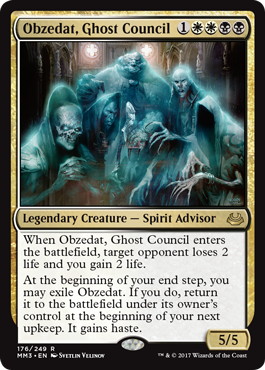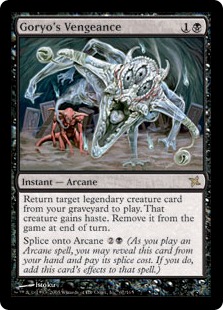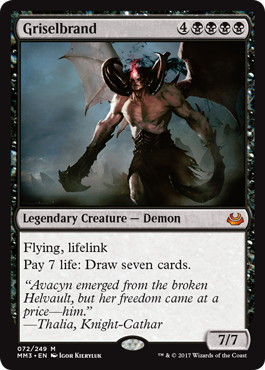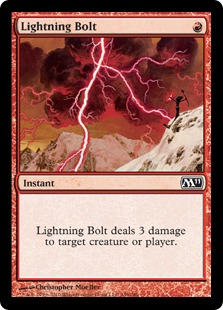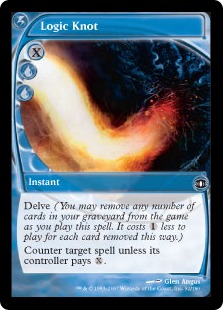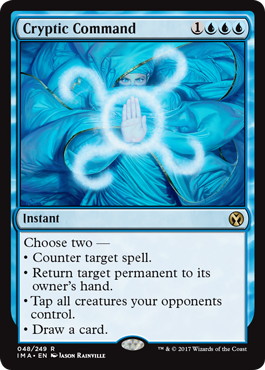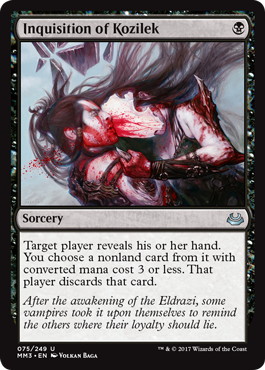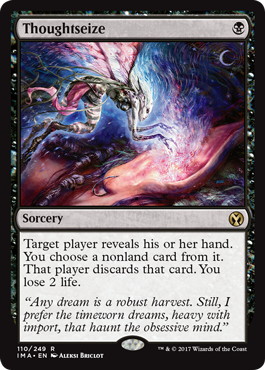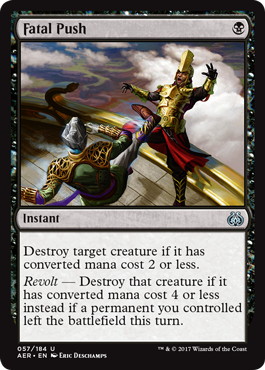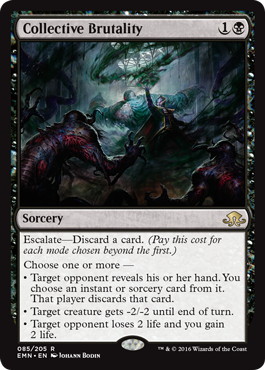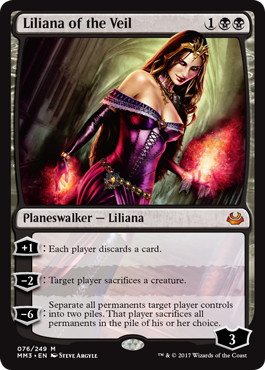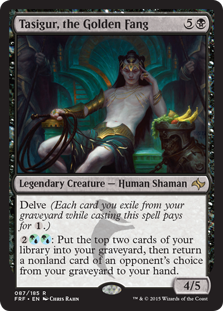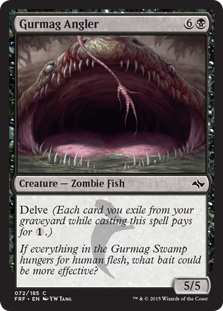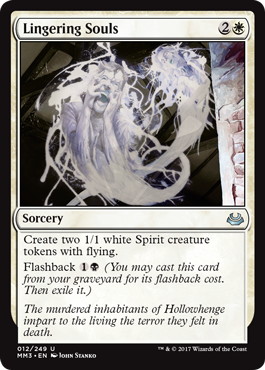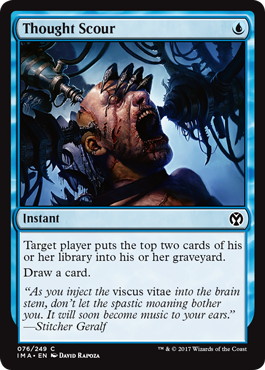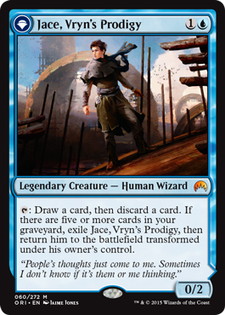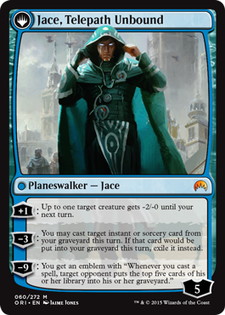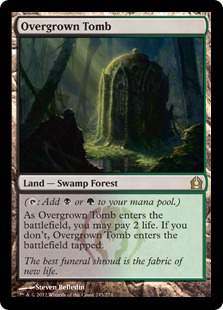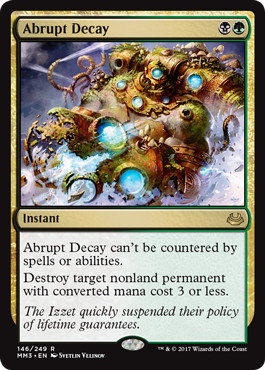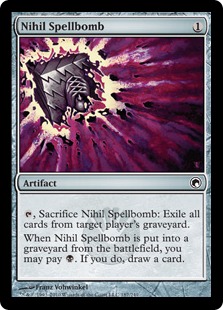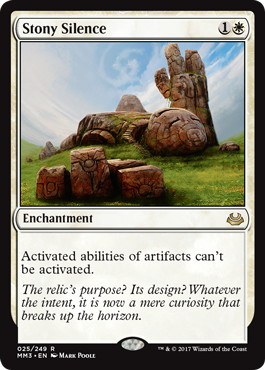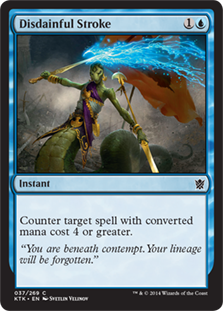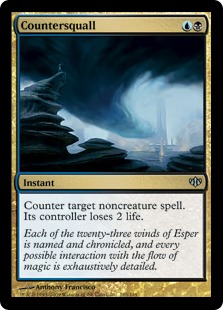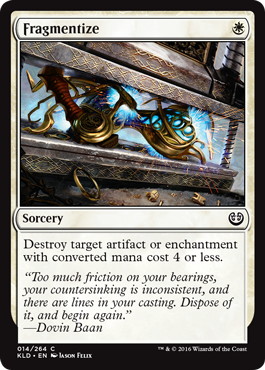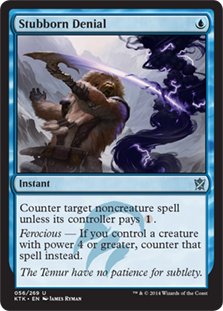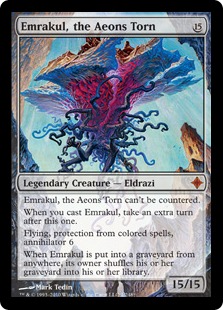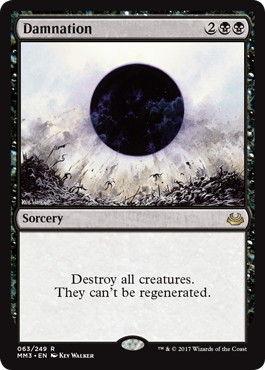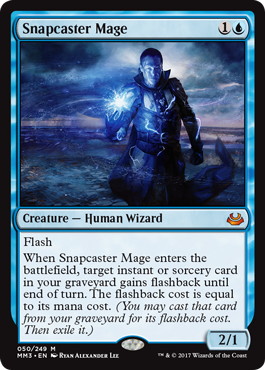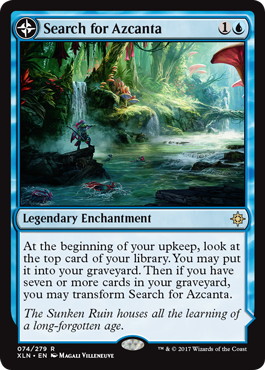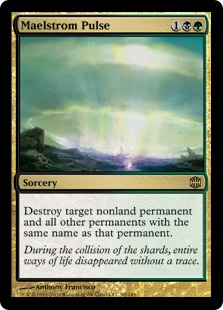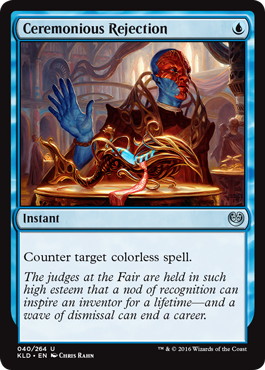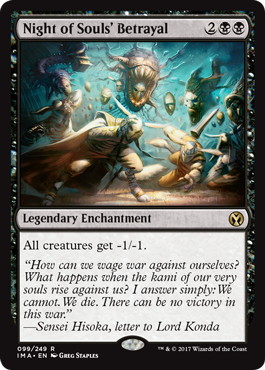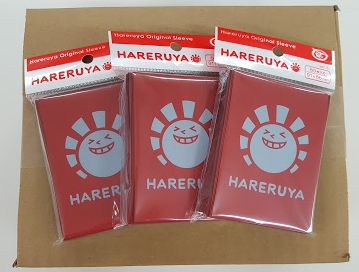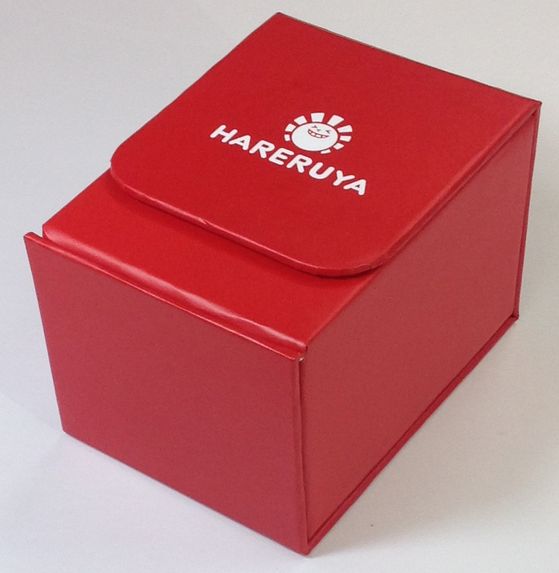Hello!
Today I’d like to write about a sweet Modern deck that I’ve built a little while ago and been playing and tuning to good results. It is basically Blue Black control deck and currently looks like this:
- Marc Tobiasch – Esper 《Goryo's Vengeance》
1 《Island》
1 《Watery Grave》
1 《Hallowed Fountain》
1 《Godless Shrine》
1 《Overgrown Tomb》
4 《Polluted Delta》
4 《Marsh Flats》
3 《Darkslick Shores》
-Land (18)- 4 《Jace, Vryn's Prodigy》
1 《Obzedat, Ghost Council》
2 《Tasigur, the Golden Fang》
1 《Gurmag Angler》
4 《Griselbrand》
-Creature (12)-
The thing with control in Modern in my opinion is that you want to have a lot of generic ways to trade cards as well as a quick way to wrap up the game. This is because Modern is such a diverse format that it is simply not possible to tune your deck to have all the right answers for all the threats you will encounter during a typical tournament of Modern. By generic answers I mean cards that let you trade one for one with their resources without needing them to play a certain type of card.
Commonly controlish decks will tend to heavily on the removal front, overloading on creature kill spells. That makes your deck pretty much a sitting duck against decks that do no rely on creaturecombat to win the game though. If you cannot race, since your clock is typically slower than average in a control shell and your cards cannot effectively trade with theirs you simply won’t be able to win.
This is why big mana decks like Tron or Titanshift as well as focused combo decks like 《Ad Nauseam》 or UR Storm or even something that plays on a different axis like WG Bogles or Dredge will basically be unbeatable game one. Even after sideboard since sideboard space is severely limited you typically won’t be able to consistently turn these matchups around with your run of the mill control deck.
The best generic answers are counterspells, since they are good in any situation be it early in the game or as a lategame topdeck. In Modern this is problematic though since frankly the threats are mostly very low to the ground in terms of deployment speed the counterspells available in the format are quite restricive in what they hit or very expensive to cast.
The next best generic answers are discard spells since they will always trade for a card at the very cheap cost of one mana. They have two huge drawbacks though:
1) They are tempo negative, since while they have to cast their spell first if you want to counter it they will have to spend their turn to do it if you discard their spell they will simply use their turn to cast something else while you had to invest your mana to cast the discard spell.
2) They quickly become dead draws when your opponent is playing of the top of his library. This is especially important for decks that want to go long like your typical control deck. Controlling the flow of the game, and trading cards with your opponent in order to leverage your superior lategame, which is the typical way a controldeck wins, doesn’t work so well if you tend to draw a significant amount of dead cards in the lategame.
To power through the first point you need to have a high density of tempo positive plays to return to parity. Mostly this will be cheap removal spells, since most of the fast decks in the format rely on creatures in some form to win. This includes decks like Burn as well as decks like UR Storm. So 《Fatal Push》 will be tempo positive a lot of the time, letting you double spell early to recover from the tempo loss of playing discard spells.
This approach will leave you weaker to the type of deck that I alluded to earlier that don’t rely on creatures. However, you do then buy yourself a window since those decks tend to be synergy based, meaning they need to assemble a certain number of cards together in order to win. Discard spells will slow them down enough usually that the tempo loss incurred becomes less of an issue.
The second point is more of a problem. To build a control deck that can function through this problem is tough since you need to either have an engine that will provide enough of an advantage that drawing some dead cards will be a nonfactor or you will need to kill your opponent fast enough that this doesn’t matter enough to cost you the game.
However both those approaches are hard to manage since the slots in the deck for either will be limited due to the vast amount of cards in your deck being about trading with your opponents. In the list I am advocating today I believe that I have found a way to mitigate all the points before.
The Answers:
This category is what I talked about just now. Cards that will let actively trade cards with your opponent, drawing out the game by disrupting their avenue to victory. It is notable that these are among the most mana-efficient and versatile answers available in the format. Also they do double duty as enablers for our engine as well as our way to win the game making for a nice cohesive shell.
The Win Conditions:
These threats are very cheap (well 《Griselbrand》 and 《Obzedat》 are cheap when you can get them into play for 2 mana at instant speed at least) and are able to play both defense and offense very well. The main win condition is also your engine and gets support from your disruptive package.
Velocity, or Putting It All Together:
These cards let your dig for the cards you need while putting cards in the graveyard to fuel different parts of your deck.
How It All Works:
The centerpiece of the deck is 《Jace, Vryn's Prodigy》 and 《Goryo's Vengeance》. Both are very cheap cards at two mana that pack a hell of a punch. Letting you go toe to toe with the fastest decks in the format.
《Jace》 has a huge target on its head since you threaten to flip is as soon as turn three and the loot effect has tremendous power in this deck letting you discard your 《Griselbrand》 or 《Obzedat》 to reanimate. So if they are unable to kill it it will usually proceed to win the game either immediately or through the value the planeswalker side generates. If they do kill it however woe to them.
A very common playpattern is playing it on turn 2 and them killing it on their turn. However since it is a legendary creature you can answer by casting 《Goryo's Vengeance》 on it to return it to play with haste. Immidately activating it to loot away ideally a big fatty and triggering the flip.
Since while flipping it gets exiled first the game sees it as a new card an as such will not get exiled to the delayed trigger from the 《Vengeance》. So you have a planeswalker in play that conveniently enough can immediatly “-3” on the same 《Vengeance》 that brought it back to play reanimating the fatty you just discarded with the loot ability.
This sequence usually ends the game on the spot since a 《Griselbrand》 that hits them for 7 and draws you up to 21 cards will almost certainly set up another one next turn while ripping everything they have to shred.
《Obzedat》 may look like an odd inclusion, but it is more powerful than it may look. The way 《Obzedat》 works is that when you return it to play with 《Goryo's Vengeance》 you can attack with it and then stack the “end of turn” trigger from it after the delayed trigger from the 《Vengeance》.
This way it will resolve first and exile itself. By the time the 《Vengeance》 trigger resolves it is already gone and will therefore return at the beginning of your next upkeep again, draining them and being a hasty 5/5 beater that is hard to kill since it doesn’t die to burn, sorcery speed removal or 《Fatal Push》 and even if they do kill it another 《Vengeance》 will get it back with haste for two mana getting another drain trigger in the process.
Both 《Obzedat》 and 《Griselbrand》 hit for 7 total, so any 3 hits will be lethal. Usually it will be 《Griselbrand》 first, setting up both 《Obzedat》 and another 《Griselbrand》 for next turn. With the Fetchland/Shockland manabases being so common in Modern opponents tend to have less life though and often a 《Griselbrand》 hit that sets up an immediate “Delve Creature” plus another 《Griselbrand》 hit next turn will be enough as well. 《Collective Brutality》 can add the last points of damage as well. So usually returning a 《Griselbrand》 will present lethal in two turns.
This way you have an engine that will provide both the quick clock to end the game you need to combat the strategies where your removal might be dead as well as the capability to grind everyone out, since even if they somehow defend themselves to not die to your onslaught, for example by chumpblocking with 《Lingering Souls》, drawing 14 or 21 cards, most of them being cheap answers will be enough to overcome any resistance in the long run.
The reason why this works is that you can almost incidentally get your payoff cards in your graveyard. 《Thought Scour》 milling them especially if you can know they are there with 《Serum Visions》, looting them away with 《Jace, Vryn's Prodigy》 or discarding them to 《Liliana of the Veil》 or 《Collective Brutality》 all let you get them into the graveyard for essentially free and 《Thoughtseizing》 yourself can work in a pinch as well.
The odd card out is 《Lingering Souls》 which is in the deck since it is very good in some matchups to buy time while being free almost all the time in terms of card economy due to the fact that the deck is built so heavily to enable specific cards going to the graveyard. It also bridges well into your secondary strategy of just playing a jundesque game of discard, removal spells planeswalkers and cheap threats with 《Tasigur》 and 《Gurmag Angler》 while saving sideboard space.
Sideboard
Speaking of the sideboard, you may have noticed the 《Overgrown Tomb》 in the manabase. This is for 《Abrupt Decay》. People will usually board in cards like 《Rest in Peace》, 《Relic of Progenitus》 and the like.
While you could board in specific answers to those cards I prefer having a card in the sideboard that can answer their hate when necessary but can also just be a decent removal spell against a creature if you don’t need to kill it or they don’t draw it. Since you can play a decent game of just playing midgrange against their hate I don’t like having specific answers that might be dead in some games and the green splash is well worth it in my opinion.
The sideboard I have at the moment is as follows, though keep in mind that Modern is a very fluent format in terms of metagame development as well as local trends.
Cards I had at some point might deserve a spot in the future either main or side include: 《Emrakul, the Aeons Torn》, 《Damnation》, 《Snapcaster Mage》, 《Search for Azcanta》, 《Maelstrom Pulse》, 《Ceremonious Rejection》 and 《Night of Souls' Betrayal》.
Conclusion
I can certainly recommend this deck as it is both fun and interesting to play while giving you a chance to play control in a format where that has been traditionally hard to pull off. There are a lot of intricacies as you can imagine, but I believe practice is the best remedy.
Have fun with this or any other deck in the wide open format that is Modern right now and don’t stop brewing!
Marc Tobiasch
Recommended Items
German powerhouse who continues to be active in Europe’s premier event and attracts attention. He is also famous as a deck builder. His construction was taken up by official coverage.
In the Pro Tour: Amonkhet, he was undefeated in the draft round, and he won the Top 8 awards with its momentum.



